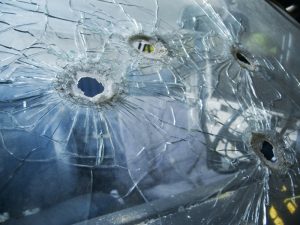The incidences of road rage and allegations of shooting into occupied vehicles have increased substantially in Raleigh and  throughout North Carolina.
throughout North Carolina.
Discharging a firearm or “barreled weapon,” as is described in North Carolina General Statute Chapter 14-34.1, is a felony criminal charge. That NC Criminal Law is interpreted by Courts in NC to be broadly interpreted.
The law against shooting into buildings and vehicles, when they are “occupied,” includes several different types of conveyances, buildings, structures, equipment, devices, and enclosures.
As set forth by the North Carolina Supreme Court, the stated purpose of the law is to protect occupants of different types of vehicles and properties “from being shot at.”
If you’ve been accused of a crime of violence, including shooting into occupied vehicles or buildings, it’s important to take those charges seriously.
Given the nature and severity of the offense, an active prison term is something that should be considered as a possibility – John Fanney, Criminal Defense Lawyer in Raleigh.
What does the State have to prove?
Lawyers who handle criminal charges in Raleigh, and throughout all of North Carolina, often focus on the Burden of Proof.
The prosecutor, ordinarily the Assistant District Attorney assigned to the case, is responsible for presenting evidence of the essential elements of the alleged crimes. The Defendant carries no Burden of Production of Evidence or Burden of Proof.
Assault with Deadly Weapon Inflicting Serious Injury
Regarding accusations of shooting into occupied vehicle, the State may make its Burden of Proof by presenting admissible evidence as to the essential elements. Defense lawyers may also refer to that as the prima facie elements of the offense.
Those “first facts” or essential elements of the crime, generally speaking, may include things like:
- The defendant, the person accused of criminal charges in Wake County, NC
- Discharges with intent, Willfully and Wantonly
- A Barreled Weapon or Firearm
- Into a “Property” or “Vehicle” or other “Conveyance”
- That another person “occupies” or that is occupied at the time of the discharge of the firearm
What does the Essential Element “Into Property” Mean?
The NC Criminal Law (NCGS 14-34.1) regarding Discharging a Firearm and Shooting into occupied vehicle or property can be somewhat confusing.
The projectile may strike the exterior of the property or extensions of that property, depending on the nature and allegations of the criminal offense.
The law is written to include structures, buildings, homes, and basically anything that can be occupied by human beings. That may be an airplane, a house, a car, a truck, or office building – John Fanney, Wake County Criminal Lawyer
Each case and each fact pattern, whether a felony or misdemeanor charge, deserve careful attention to the allegations. That is true whether a Criminal Summons, Warrant for Arrest, or True Bill of Indictment is presented or issued, as the case may be.
Self Defense Laws in North Carolina
As such, discharging firearms or some other sort of barrelled weapon into an occupied property may include, as defined by the legislature, erections, devices, equipment, enclosures, vehicles, aircraft, private buildings occupied by people, residences, public buildings and structures, and other conveyances,
Under the law, a conveyance is something that transports people two and from different places. Conveyances also may also transport items and can include things like trucks, airplanes, aircraft flying in the area, motorized vehicles, etc. Again, each case, like each person accused of a crime, is different.
It’s important to understand that shooting into an occupied property, dwelling, or vehicle does not necessarily require the projectile or bullet to penetrate the exterior surface of the conveyance or dwelling.
It may be enough to show that the bullet or the projectile from the barreled weapon struck the exterior of the building or vehicle or structures or items attached to them. The law may apply to public or private buildings.
For example, shooting into occupied vehicle charges may include striking the toolbox in the back of a truck or a porch connected to a house. Those two examples, under the Criminal Laws in NC, may allow for a conviction.
It need not produce death or great bodily harm.
What is Specific Intent?
The “specific intent” to commit an act is generally thought to be the “evil mind.” Defense lawyers may refer to that as the mens rea.
Shooting at an occupied vehicle or structure is all that is required.
The intent to kill or to inflict serious bodily injury or harm to that person is not an essential element of the crime.
As such, it is not a defense to say, “I just intended to scare them. I didn’t shoot anywhere near them. I knew the bullet wouldn’t go through the door or wall or glass.”
The reasoning behind the law against Shooting into Vehicles and Buildings is to protect people from serious injuries and death., even if such is not intended. The ‘evil mind’ is to shoot at someone, even if you don’t mean to hit or kill them – John Fanney, Criminal Lawer in Raleigh NC
Lawyers in Raleigh who handle Shooting Into Vehicle Charges
John Fanney is an experienced criminal defense attorney in Raleigh, well versed in the nuances of courtroom advocacy.
Our law firm is dedicated to helping people with their criminal charges in Wake County and the surrounding judicial districts, whether that is a felony or a misdemeanor, DWI charges, assault and battery, or serious weapons charges.
Our consultations for criminal matters are free of charge.
We also keep confidences. What you tell our criminal lawyers and support staff is strictly confidential.
We want to provide you with sound legal advice. That means you should feel comfortable sharing with us everything about your case. We want to help you – John Fanney, Wake County Criminal lawyer
 North Carolina Criminal Law Updates
North Carolina Criminal Law Updates